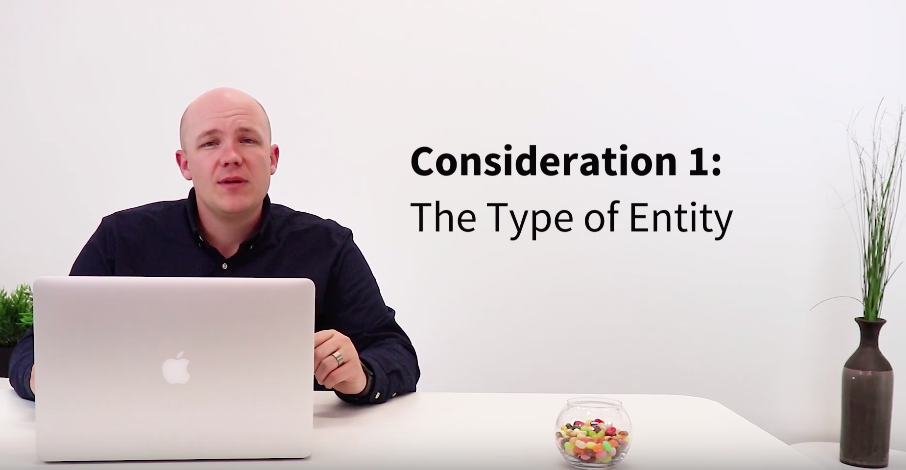Before you create your tax and accounting business you should establish a clear vision of what you want your company to become. The more you focus your overall vision, the more likely you are to achieve it. One of the best ways to do this is to create a business plan.
A business plan is often referred to as the roadmap of a business. It’s a comprehensive document that outlines important aspects of your current and future business operations. It also helps give your business direction by clarifying your objectives and goals. In this video, we walk through seven things you will want to consider while creating a business plan for your tax practice.
Number one: The type of entity
An important step in your business planning process is to decide what type of entity you will identify as. The different types of business entities are limited liability companies, also known as LLCs, C corporations, S corporations, partnerships, and sole proprietorships. Each has specific legal rights and responsibilities, from tax requirements to lawsuits, the number of shareholders, and profit divisions.
Many small businesses start as sole proprietorships and only look into other types of entities as they grow. Sole proprietorships are the simplest type of entity. However, they don’t offer much legal protection from litigation or debt collection. As a sole proprietor or a member of a partnership, personal assets such as your house and savings account can potentially be seized to satisfy business debts. Organizing as an LLC is a good alternative for small businesses who want to separate their personal liability from business liabilities.
Number two: Insurance costs
Insurance is a costly expense but is extremely important. Purchase the necessary insurance to ensure that you and your company are protected against any unexpected liabilities. Common insurance selections for tax practitioners are professional liability and health insurance. If you want additional protection, you can also consider purchasing disability, business interruption, errors and omissions, or property insurance.
We know there are a lot of insurance options, but don’t feel like you have to get every one. We recommend clarifying what your risks are and moving forward as you see best. Whichever insurance options you choose, be aware of the recurring costs and ensure that they fit into your budget.
Number three: Finances and budgeting
Budgeting is one of the most important aspects of starting your own business, so make this one of your top priorities as you build your business plan. The initial time spent creating your budget will have a huge effect on the business you are planning. Not only will it help ensure that your finances are under control, but it will help give you the confidence you need to focus on creating a thriving business.
Your budget doesn’t have to be overly complicated. A simple spreadsheet detailing your expenses and income is a great place to start.
Number four: Client payment methods
It’s hard to manage your budget if your clients miss payment deadlines or neglect to pay them entirely. As a business owner, you should do all you can to prevent this. A business plan is a good place to formalize your strategy for effectively collecting accounts receivable. The easier you make it for clients to pay you, the easier it will be for you to collect your payments on time. Consider offering a combination of traditional and modern payment options to your clients, including check, credit card, PayPal, or other online services. There are also many cloud-based accounting softwares like Canopy that let you effortlessly send invoices directly to your clients.
Number five: Services offered
Focus on what you are best at and make it a foundation of your company. Some accountants prefer bookkeeping and tax preparation, while others prefer tax resolution and wealth management. Other accountants prefer to focus on a very specific type of client and provide a wide range of services to that niche.
Whatever you prefer, make sure you have a clear strategy articulated in your business plan. You may decide to broaden your offerings, but limiting your focus is extremely helpful as you’re getting your new practice off the ground. Not only will it help keep you from getting overwhelmed with limited resources, but it can also help you acquire more of the right kind of clients as you build your reputation in a specific area.
Number six: Scope
In addition to plans for the immediate future, a business plan is a good place to write down your goals for the long term. What do you want your business to look like two, five, and even ten years from now?
These goals will help you make better decisions today—decisions that help move you toward your long-term goals. For example, you would take very different actions if you wanted to be a small, sole proprietorship versus a top 100 firm. Scope should include how many people you want to employ, anticipated revenue, number of locations, etc. When determining your scope, be realistic, but don’t be afraid to give yourself a challenge to work towards.
Number seven: Executive summary
The most technical part of the business plan is the executive summary. It is a one page, written overview of your company that gives a quick snapshot of where the company is at. This summary is vital if you plan to look for startup capital to help jumpstart your tax practice. Whether you’re considering approaching investors or just getting a small-business loan, this summary will be one of your most important tools for securing startup money.
For this reason, the executive summary should summarize your entire business plan in an insightful and appealing way. A good executive summary should be attention-grabbing, easy-to-digest, and concise. Invest time and effort into your executive summary so it can sell the entire business to readers.
Be sure to subscribe to our YouTube page and follow along with the rest of our How to Start a Tax Practice series.







Get Our Latest Updates and News by Subscribing.
Join our email list for offers, and industry leading articles and content.